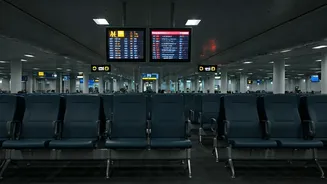Arriving Late is Bad
One of the most frequent reasons for missing a flight involves a late arrival at the boarding gate. Passengers sometimes underestimate the time needed
for check-in, security checks, and navigating the airport. Many factors can contribute to delays, including traffic congestion, long queues at security, and the distance between the check-in counter or security checkpoint and the boarding gate itself. Airlines typically close the boarding gate 15 to 30 minutes before the scheduled departure time. Missing this deadline means you could be denied boarding. To prevent this, always arrive at the airport well in advance, check the terminal and gate number, and factor in potential delays.
Checking the Wrong Gate
Airports are vast places, and gate assignments can change at any moment. Passengers who fail to confirm their gate number before heading to the boarding area run the risk of going to the wrong location. Gate changes can occur for many reasons, from aircraft swaps to operational adjustments. Relying solely on the original gate information printed on your boarding pass could be a recipe for disaster. To avoid this, constantly monitor the flight information displays throughout the airport. These screens are regularly updated with the latest gate assignments. It's also wise to double-check with airline staff or use the airport's mobile app to get the most accurate, up-to-the-minute information about your flight's gate.
Ignoring Announcements Entirely
Airports broadcast crucial announcements that can impact a passenger's flight, from gate changes to boarding updates. Some travelers, however, ignore these announcements, whether through using headphones, being engrossed in other activities, or simply not paying attention. These announcements are often the primary way the airline communicates important information to its passengers, including last calls for boarding. The consequences of missing an announcement can be severe, potentially leading to missed flights. Therefore, it is important to pay close attention to the public address system. Reduce the volume on any personal devices and remain aware of what is being announced.
Not Listening to the Rules
Airport security and airlines have rules regarding baggage, prohibited items, and boarding procedures. Many passengers fail to familiarize themselves with these regulations. Baggage restrictions vary depending on the airline and the class of service, impacting the size and weight limits for carry-on and checked luggage. Some items are strictly forbidden in both carry-on and checked baggage, such as certain liquids, sharp objects, and flammable materials. Being unaware of these rules can lead to delays at security checkpoints, and the confiscation of items. Checking the airline's and airport's guidelines before traveling helps you avoid these issues.
Having Unprepared Documents
Travel requires proper documentation, including boarding passes, identification, and visas if needed. Failing to have these documents readily available and in order is a common error. Passengers who spend too long searching for their documents during the boarding process can hold up the queue and risk missing their flight. Additionally, incorrect or expired documents can prevent boarding. Always keep your boarding pass and identification easily accessible. Verify that your passport, visa (if required), and any other necessary documents are current and valid. Keeping all relevant documents in a single, accessible place can help avoid delays and frustration.
Not Boarding in Time
Boarding typically begins 30 to 60 minutes before the flight's scheduled departure, depending on the aircraft and airline. It's vital to be at the gate when boarding starts. Passengers who arrive late may find that the gate has closed, or that their seat has been reassigned to a standby passenger. Sometimes there can be unexpected situations such as issues with their documents. Missing the boarding deadline often means missing the flight and potentially forfeiting the ticket. Always be at the gate at least 30 minutes before departure. Keep an eye on the boarding status to know when it is time to board. Make sure you are at the correct gate at the right time.
Distracted During Boarding
Distractions can lead travelers to miss important boarding calls or delays. Common distractions include being engrossed in conversations, using electronic devices, or shopping at airport stores. These distractions can cause you to miss boarding announcements or fail to notice boarding gate changes. Even small distractions can lead to missed flights. Always remain attentive to any announcements. Minimize distractions by silencing mobile phones, and keeping an eye on the boarding status. Be present and focused on the boarding process. By minimizing distractions, passengers can improve their chances of a smooth and on-time boarding experience and prevent missing their flight.













